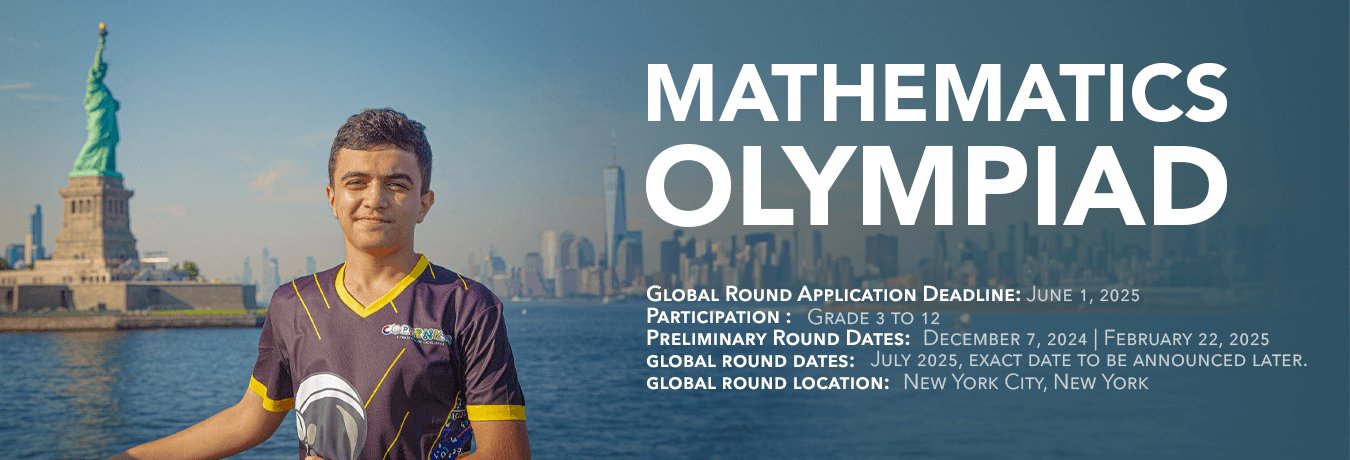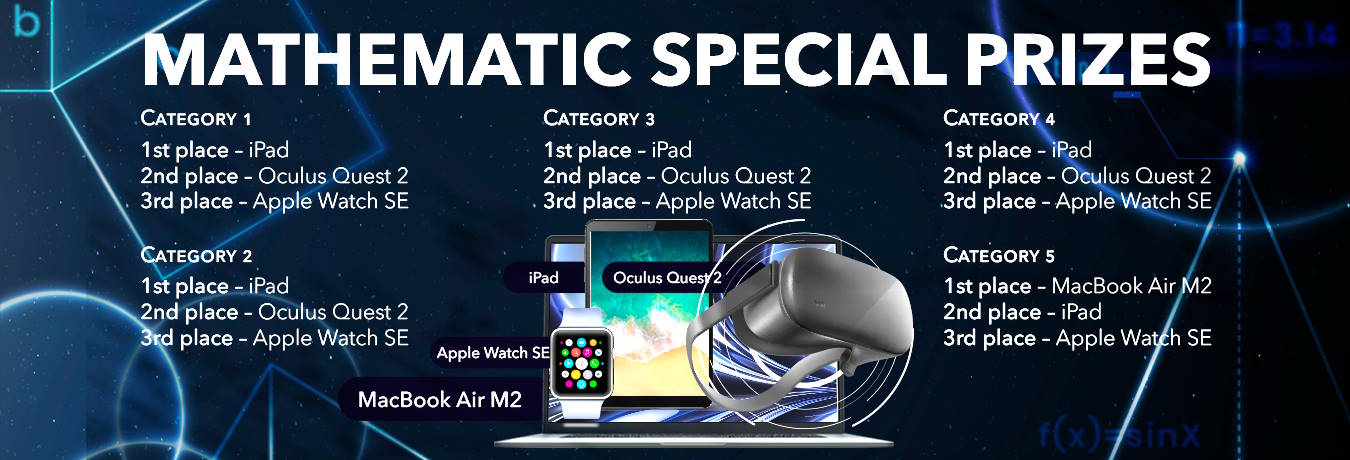
Mathematics Olympiad
Introducing The Mathematics Olympiad
The Copernicus Mathematics Olympiad is a prestigious international competition open to students from Grade 3 to Grade 12. It consists of two main stages: the Preliminary Round and the Global Round.
Preliminary Round
Registration:
Students can register for the Olympiad online through the Copernicus Olympiad website or via official representatives in their respective countries.
Dates:
The online qualifying exams for the Preliminary Round are scheduled for December 7, 2024 and February 22, 2025
Format:
The exam comprises 25 multiple-choice questions to be completed within a 60-minute timeframe. Each question is aligned with the participant’s educational level, divided into the following categories:
Category 1: Grades 3 and 4
Category 2: Grades 5 and 6
Category 3: Grades 7 and 8
Category 4: Grades 9 and 10
Category 5: Grades 11 and 12
Scoring:
Each correct answer is awarded 4 points. An incorrect answer incurs a penalty of -1 point. No points are deducted for unanswered questions.
Qualification: Participants scoring at least 40% in the Preliminary Round are eligible for the Global Round. All participants receive a Certificate of Participation.
Recognition:
Depending on their scores, qualifiers receive the following accolades:
- 40% to 49%: Honorable Mention Certificate
- 50% to 74%: Bronze Medal
- 75% to 90%: Silver Medal + 5% discount on Global Round registration fees
- 91% to 100%: Gold Medal + 10% discount on Global Round registration fees

Global Round:
The Global Round is designed to challenge and inspire the brightest young minds in mathematics from around the world.
Date and Location:
The Global Round will take place in July 2025 at Columbia University, New York City. The exact dates will be announced soon.
Events:
This round features a combination of a challenging exam, interactive activities, and educational tours, providing a comprehensive and engaging experience for all participants.
Registration for Qualifiers:
Qualifiers from the Preliminary Round must register again for the Global Round through the official website or country representatives, providing essential travel documentation as part of their application.
Exam Details:
Format:
The exam consists of 20 multiple-choice questions and 5 numerical-answer questions, tailored to the participants’ educational level. The categories are structured similarly to those in the Preliminary Round.
Duration:
Participants have 90 minutes to complete the exam.
Scoring:
Multiple-choice questions: Each correct answer is worth 4 points, with a penalty of -1 point for each incorrect answer. No points are deducted for unanswered questions.
Numerical-answer questions: Each correct answer is worth 4 points, with no penalty for incorrect or unanswered questions.
Recognition:
In the Global Round, medals will be awarded based on the following percentages:
- The top 10% will receive a Gold Medal.
- The next 11-30% will receive a Silver Medal.
- The next 31-60% will receive a Bronze Medal.
- The next 61-75% will receive an Honorable Mention Certificate.

- Additionally, the top three students of each Category in the Global Round Exam will receive special prizes listed below:

Syllabus | Mathematics |
|---|---|
Category 1 (Grades 3 and 4)
| • Addition, subtraction, multiplication, and division of numbers up to 10,000 • Addition, subtraction, multiplication, and division of fractions • Divisibility by 2, 3, 4, 5, 6, 7, 8, 9, 10, 11, and 13 • Prime numbers • Venn diagram • Systems of measurement (length, area, volume, mass, and time) • Area and perimeter of rectangles • Recognizing geometric figures • Parallel and perpendicular lines • Mathematical logic • Word problems • Recognizing patterns in sequences • Bar graphs |
Category 2 (Grades 5 and 6)
| • Category I topics • Arithmetic operations with decimals, fractions, mixed fractions, and improper fractions • Factor and multiples • LCM and GDF • Simple statistics • Percentage • Simple interest calculations • Ratio • Linear equations • Perimeter of polygons • Area of triangles • Properties of squares, rectangles, triangles, parallelograms, and trapeziums • Angles (acute, right, and obtuse) • Volume of cubes and cuboids • Line of symmetry |
Category 3 (Grades 7 and 8)
| • Category II topics • Advanced topics in fractions • Squares and square roots • Rational numbers • Irrational numbers • Equalities and inequalities • Simple algebraic expressions • System of equations • Linear functions • Simple combinatorics and probability • Ratio and proportion • Regular polygons • Area and circumference of a circle • Area and perimeter of composite figures • Pythagorean Theorem • Congruence and similarity • Volume and surface area of prisms and cylinders |
Category 4 (Grades 9 and 10)
| • Category III topics • Real numbers • Advanced topics in exponentiation • Quadratic functions • Polynomials • Logarithms • Graph interpretation • Mean, median, and mode • Law of sines and cosines • Properties of circles • Volume and surface area of pyramids, cones, and spheres • Coordinate geometry |
Category 5 (Grades 11 and 12)
| • Category IV topics • Advanced topics in algebra • Advanced topics in inequalities • Remainder theorem • Factor theorem • Advanced topics in logarithms • Complex numbers • Binomial theorem • Non-linear equations • Summation of series • Advanced topics in combinatorics and probability • Advanced topics in trigonometry • Advanced topics in coordinate geometry |